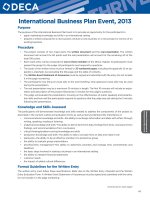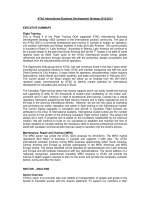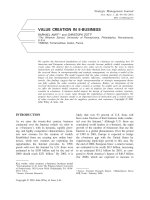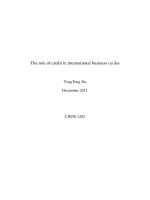National differences in international business
Bạn đang xem bản rút gọn của tài liệu. Xem và tải ngay bản đầy đủ của tài liệu tại đây (806.27 KB, 54 trang )
International
Business 7e
by Charles W.L. Hill
McGraw-Hill/Irwin Copyright © 2009 by The McGraw-Hill Companies,
Inc. All rights reserved.
Chapter 2
National Differences in
Political Economy
2-3
Political Systems
The political economy of a nation refers to how the
political, economic, and legal systems of a country are
interdependent; they interact and influence each other, and
in doing so they affect the level of economic well-being
2-4
Political Systems
Political system refers to the system of government in a
nation
Political systems can be assessed according to two
dimensions
the degree to which they emphasize collectivism as
opposed to individualism
the degree to which they are democratic or totalitarian
2-5
Collectivism And Individualism
Collectivism refers to a political system that stresses the
primacy of collective goals over individual goals
Collectivism can be traced back to the Greek
philosopher, Plato (427-347 BC), but in modern times,
collectivism is equated with socialists
2-6
Collectivism And Individualism
Socialists advocate state ownership of the basic means
of production, distribution, and exchange
State-owned enterprises are managed to benefit society
as a whole, rather than individual capitalists
In the early 20
th
century, socialism split into:
Communism – socialism can only be achieved through
violent revolution and totalitarian dictatorship
Social democrats – socialism is achieved through
democratic means
2-7
Classroom Performance System
A political system that stresses the primacy of collective
goals over individual goals is called
a) individualism
b) collectivism
c) a democracy
d) a market economy
2-8
Collectivism And Individualism
By the mid-1990s, communism was in retreat worldwide
Social democracy is also retreating as many countries
move toward free market economies
State-owned enterprises have been privatized
2-9
Classroom Performance System
_____ believe (s) that socialism can only be achieved
through violent revolution and totalitarian dictatorship.
a) communists
b) social democrats
c) social republicans
d) Plato
2-10
Collectivism And Individualism
Individualism refers to philosophy that an individual should
have freedom in his own economic and political pursuits
Individualism can be traced to Greek philosopher, Aristotle
(384-322 BC), who argued that individual diversity and
private ownership are desirable
Under individualism, individual economic and political
freedoms are the ground rules on which a society should be
based
More practically, individualism means democratic political
systems and free market economies
2-11
Democracy And Totalitarianism
Democracy refers to a political system in which
government is by the people, exercised either directly or
through elected representatives
Totalitarianism is a form of government in which one
person or political party exercises absolute control over all
spheres of human life and prohibits opposing political
parties
Democracy is usually associated with individualism and
communism is usually associated with collectivism and
totalitarianism
2-12
Democracy And Totalitarianism
Pure democracy is based on the belief that citizens
should be directly involved in decision making
Most modern democratic states practice representative
democracy where citizens periodically elect individuals to
represent them
2-13
Classroom Performance System
A form of government in which one person or political party
exercises complete control over all spheres of human life
and prohibits opposing political parties is
a) a democracy
b) a representative democracy
c) totalitarianism
d) socialism
2-14
Democracy And Totalitarianism
There are four major forms of totalitarianism:
Communist totalitarianism – found in states where the
communist party monopolizes power
Theocratic totalitarianism - found in states where political
power is monopolized by a party, group, or individual that
governs according to religious principles
Tribal totalitarianism - found in states where a political party
that represents the interests of a particular tribe monopolizes
power
Right-wing totalitarianism - permits some individual
economic freedom, but restricts individual political freedom
2-15
Classroom Performance System
______ is found in states where political power is
monopolized by a party according to religious principles.
a) tribal totalitarianism
b) right-wing totalitarianism
c) theocratic totalitarianism
d) communist totalitarianism
2-16
Economic Systems
Political ideology and economic systems are connected
In countries where individual goals are emphasized free
market economies are likely
There are three types of economic systems:
market economies
command economies
mixed economies
2-17
Market Economy
In a market economy all productive activities are privately
owned and production is determined by the interaction of
supply and demand
The role of government is to encourage free and fair
competition between private producers
2-18
Command Economy
In a command economy, the government plans the
goods and services that a country produces, the quantity
that is produced, and the prices as which they are sold
All businesses are state-owned, and governments
allocate resources for “the good of society”
However, because there is little incentive to control costs
and be efficient, command economies tend to stagnate
2-19
Mixed Economy
In a mixed economy, certain sectors of the economy are
left to private ownership and free market mechanisms while
other sectors have significant state ownership and
government planning
Governments tend to own firms that are considered
important to national security
2-20
Classroom Performance System
In which type of economic system are all productive
activities privately owned?
a) a mixed economy
b) a command economy
c) a representative economy
d) a market economy
2-21
Legal Systems
The legal system of a country refers to the rules that
regulate behavior along with the processes by which the
laws are enforced and through which redress for
grievances is obtained
There are three types of legal systems:
Common law - based on tradition, precedent, and custom
Civic law - based on detailed set of laws organized into
codes
Theocratic law - law is based on religious teachings
2-22
Classroom Performance System
Which type of law is based on tradition, precedent, and
custom?
a) civil law
b) common law
c) theocratic law
d) contract law
2-23
Differences In Contract Law
Depending on the legal system, contracts are
approached in different ways
A contract is a document that specifies the conditions
under which an exchange is to occur and details the rights
and obligations of the parties involved
Contract law is the body of law that governs contract
enforcement
2-24
Differences In Contract Law
Under a common law system, contracts tend to be very
detailed with all contingencies spelled out
Under a civil law system, contracts tend to be much
shorter and less specific because many issues are already
covered in the civil code
2-25
Differences In Contract Law
Many countries have ratified the United Nations
Convention on Contracts for the International Sale of
Goods (CIGS) which establishes a uniform set of rules
governing certain aspects of the making and performance
of everyday commercial contracts between buyers and
sellers who have their places of business in different
nations









